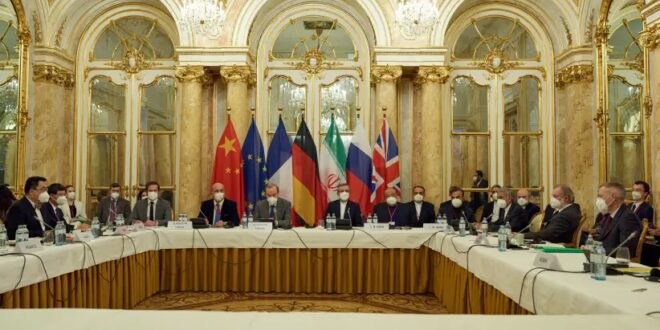Negotiations between world powers and Iran to restore the 2015 nuclear deal resumed in Vienna for the first time in over five months.
Iran took further steps to advance its nuclear program, the International Atomic Energy Agency said on Wednesday, as Iranian diplomats said they won’t rush on negotiations with world powers in Vienna to limit its uranium enrichment.
The IAEA reported that Iran started the process of enriching uranium to 20% purity with advanced centrifuges at its Fordow facility, which is buried inside a mountain.
Iran fed uranium hexafluoride feedstock enriched to up to 5% into a cascade, or cluster, of 166 IR-6 centrifuges at Fordow to enrich it further to up to 20%, the IAEA stated.
The move is likely to raise tensions in the negotiations intended to restore the return of Iran and the US to the 2015 Joint Comprehensive Plan of Action nuclear deal.
Israeli officials, including Foreign Minister Yair Lapid in meetings with UK Prime Minister Boris Johnson and French President Emmanuel Macron this week, have warned that Iran is trying to stall so that it can continue to advance its uranium enrichment to the point at which an agreement restricting it would be irrelevant.
In that vein, an Iranian diplomat said on Wednesday that his team will not work under “artificial deadlines” in nuclear talks even as Europeans have pressed for the Islamic Republic to demonstrate its seriousness in the coming days.
Iran, “stands prepared to continue intensive talks as long as needed, [but] it will not be ready to sacrifice its principled demands and the Iranian nation’s rights for mere artificial deadlines or time tables,” a source on Iran’s negotiating team source told Iranian state media Press TV on Wednesday.
“The Islamic Republic has come to Vienna with full seriousness and is negotiating with transparent demands and proposals,” the source stated.
Iran and world powers reconvened in Vienna on Monday to negotiate a return to compliance with the JCPOA for the first time in over five months, with discussions about lifting US sanctions on Tuesday and for a working group on nuclear issues to meet Wednesday. The American and Iranian teams were in separate rooms in Palais Coburg, because Iran refuses to negotiate directly with the US.
Iranian remarks about negotiating as long as necessary came after diplomats from the E3 – France, Britain and Germany – briefed reporters that there will be a problem if Iran does not show that it is taking the negotiations seriously this week.
However, the diplomats also said that they did not want to impose an artificial deadline.
As for reports that Iran is moving towards 90% enrichment of uranium, the level required for a nuclear weapon, the diplomats said that could endanger the talks, but cautioned that those reports are not confirmed.
It remained unclear to the diplomats whether Iran would resume talks where they left off in June, when, they estimated, an agreement was 70-80% complete.
Iran’s top negotiator Ali Bagheri made ambiguous comments on the point from which talks would continue.
“Drafts are subject to negotiation,” Bagheri told Iranian state media on Tuesday. “Therefore, nothing is agreed on unless everything has been agreed on. On that basis, all discussions that took place in the six rounds are summarized and are subject to negotiations. This was admitted by all parties in today’s meeting as well.”
Israel opposes the JCPOA because it insufficiently limited Iran’s uranium enrichment, and, in fact, legitimizes further enrichment after the agreement expires, which paves the way for an eventual nuclear bomb. In addition, the JCPOA did not address Iran’s other malign actions in the region.
But worse than the JCPOA, Israeli officials say, would be an interim deal that would barely restrict Iran’s nuclear program. Iran has repeatedly said it will only negotiate the lifting of all post-JCPOA US sanctions and not the nuclear issue.
As such, Jerusalem has grown increasingly concerned that the US is considering such an agreement, which some diplomats have called “less for less,” to have the US lift some sanctions in exchange for Iran freezing – not rolling back – its nuclear program, which has advanced far beyond the JCPOA’s restrictions.
Foreign Ministry Director-General Alon Ushpiz said in an interview with KAN that this should be called “more for less,” as Iran would be getting a cash influx while conceding almost nothing.
Diplomatic sources in Jerusalem warned this week that if the US lifts sanctions – along with international sanctions soon to be lifted under the terms of the 2015 nuclear deal – Iran could reach the nuclear threshold within six months.
At that point, Israel could find it necessary to take unilateral action.
In Paris on Tuesday, Lapid called for the world to have a plan B if negotiations fail.
“Sanctions must not be lifted from Iran,” Lapid said. “Sanctions must be tightened. A real military threat must be put before Iran, because that is the only way to stop its race to become a nuclear power.”
Defense Minister Benny Gantz plans to fly to Washington next week to discuss the nuclear threat with American officials as well.
 Eurasia Press & News
Eurasia Press & News




